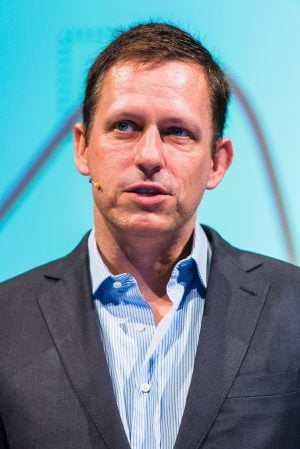PayPal Co-Founder Understands How Bad Biglaw Really Is
Peter Thiel was in Biglaw in the early 90s, but little has changed since then.

Peter Thiel (Image by Dan Taylor)
I can’t say I agree with the politics of Peter Thiel. The PayPal co-founder and Facebook investor is a Donald Trump supporter and is trying to create his own Libertarian floating city. But, man, he nails the Biglaw dilemma.
Thiel gave the commencement address at Hamilton College this weekend. As is typical of graduation remarks, he uses examples and lessons from his own life to impart some wisdom to the about-to-be-minted graduates. In particular, he discusses the lure of Biglaw — Thiel was an associate at Sullivan & Cromwell — and even though it is a prestigious option, it does not mean it is the right option for you:

Is The Future Of Law Distributed? Lessons From The Tech Adoption Curve
I did well enough in law school to be hired by a big New York law firm, but it turned out to be a very strange place. From the outside, everybody wanted to get in; and from the inside, everybody wanted to get out.
Thiel was in Biglaw in the early 90s, but little has changed since then. I suppose it is oddly comforting that some things, even if they are miserable things, never change.
When I left the firm, after seven months and three days, my coworkers were surprised. One of them told me that he hadn’t known it was possible to escape from Alcatraz. Now that might sound odd, because all you had to do to escape was walk through the front door and not come back. But people really did find it very hard to leave, because so much of their identity was wrapped up in having won the competitions to get there in the first place.
Seven months and three days in Biglaw. Damn, even Elie Mystal outlasted him.
Sponsored

Early Adopters Of Legal AI Gaining Competitive Edge In Marketplace

Is The Future Of Law Distributed? Lessons From The Tech Adoption Curve

Navigating Financial Success by Avoiding Common Pitfalls and Maximizing Firm Performance

Early Adopters Of Legal AI Gaining Competitive Edge In Marketplace
Thiel does a great job of outlining the emotional and psychological factors that make leaving Biglaw difficult, but there are also important financial factors at play for many in Biglaw. Most people graduate law school with debt, and sticking it out in Biglaw seems like the only realistic option to get out from that crushing burden.
Just as I was leaving the law firm, I got an interview for a Supreme Court clerkship. This is sort of the top prize you can get as a lawyer. It was the absolute last stage of the competition. But I lost. At the time I was totally devastated. It seemed just like the end of the world.
About a decade later, I ran into an old friend. Someone who had helped me prepare for the Supreme Court interview, whom I hadn’t seen in years. His first words to me were not, you know, “Hi Peter” or “How are you doing?” But rather, “So, aren’t you glad you didn’t get that clerkship?” Because if I hadn’t lost that last competition, we both knew that I never would have left the track laid down since middle school, I wouldn’t have moved to California and co-founded a startup, I wouldn’t have done anything new.
An important reminder that no matter how devastating a setback may seem at the time, it still possible to carve out a path that is even more rewarding.
Looking back at my ambition to become a lawyer, it looks less like a plan for the future and more like an alibi for the present. It was a way to explain to anyone who would ask—to my parents, to my peers, and most of all to myself—that there was no need to worry. I was perfectly on track. But it turned out in retrospect that my biggest problem was taking the track without thinking really hard about where it was going.
Excellent advice. Particularly for those thinking about going to law school, before you take out the loans and start down that path, make sure it is really where you want to go.
Sponsored

Legal AI: 3 Steps Law Firms Should Take Now

The Business Case For AI At Your Law Firm

Peter Thiel’s Advice To Graduates: ‘My Ambition To Be A Lawyer Was Less A Plan For The Future Than An Alibi For The Present’ [Tax Prof Blog]
Earlier: How Justice Scalia Broke PayPal Founder Peter Thiel’s Heart Long Ago
Kathryn Rubino is an editor at Above the Law. Feel free to email her with any tips, questions, or comments and follow her on Twitter (@Kathryn1).







